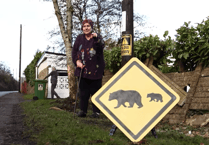PARISH councillors in the Forest are calling on highways bosses to give "serious consideration" to a default 20 mph speed limit for residential streets in Gloucestershire.
Aylburton Parish Council has written to Gloucestershire County Council asking for the implementation of the reduced limit "throughout Aylburton, and for Gloucestershire overall".
The parish councillors say the current 30 mph limit is outdated and doesn’t reflect the number of vehicles on the road today.
They say that reducing the limit would make the roads safer for residents and visitors, and would also encourage the uptake of sustainable transport and decrease pollution.
Liberal Democrat county councillors Gill Moseley, of Newent, and Up Hatherley’s Roger Whyborn proposed a motion to bring in a 20 mph limit in areas where vehicles and vulnerable road users mix back in June, but it was rejected, with Conservative councillors instead opting to refer the issue to the council’s environment and communities scrutiny committee.
In a letter to Cllr Vernon Smith, who is the cabinet member responsible for highways, a spokesperson for Aylburton Parish Council said: "We are working to improve the quality of life for the community in Aylburton.
"As part of that, we want to protect residents and visitors from road danger and pollution.
"We are looking for ways to encourage the uptake of sustainable travel like walking and cycling and improve public health for all ages and abilities.
"As you are likely aware, the 30 mph speed limit for residential areas in the UK was introduced in 1935, when there were about 3 million vehicles on British roads.
"Today there are more than 38 million vehicles.
"In other words, we have inherited a speed limit from a previous era, a time when people and vehicles mixed very differently to today.
"The first 20 mph zone appeared in the UK in 1991, 30 years ago.
"Since then, numerous authorities have introduced 20 mph limits in residential areas.
"Today an estimated 21 million people in the UK live in local authorities that embrace 20 mph for most roads where cars and people mix: Lancashire, Oxford, Bath & North East Somerset, Scottish Borders, Bristol, Manchester, Birmingham and many more.
"The Welsh Government is proposing 20 mph limits for residential streets in Wales.
The letter adds: "The council supports ’sign only’ 20 mph limits which are seven times more cost-effective than zones requiring the installation of traffic calming measures.
"It is understood that exceptions need to be made to a 20 mph default limit where the Highways Authority, having assessed the needs of vulnerable road users, believes a higher speed limit is safer."
The parish council says the benefits of 20 mph include improvements to quality of life, such as less noise and pollution and less fear and actual danger for road users.
They say that the number of casualties is "substantially" reduced by an average of 20 per cent in areas where 20 mph is introduced.
The councillors argue the reduced limit will also encourage healthier lifestyles, including the uptake of more sustainable transport modes such as walking and cycling, and an increase in the number of children being given permission to play outside.
They also say the limit is better for the environment, as travelling at slower speeds reduces carbon emissions and pollution, and that 20 mph "is popular", citing a National Travel Attitudes Study from 2019 which shows that seven out of 10 people support the limit in residential streets.





Comments
This article has no comments yet. Be the first to leave a comment.